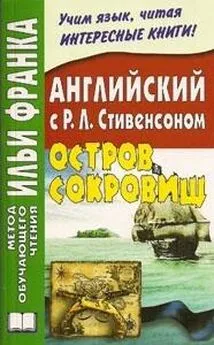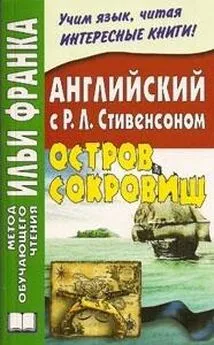Илья Франк - Английский язык с Р.Л. Стивенсоном. Остров сокровищ
- Название:Английский язык с Р.Л. Стивенсоном. Остров сокровищ
- Автор:
- Жанр:
- Издательство:неизвестно
- Год:неизвестен
- ISBN:нет данных
- Рейтинг:
- Избранное:Добавить в избранное
-
Отзывы:
-
Ваша оценка:
Илья Франк - Английский язык с Р.Л. Стивенсоном. Остров сокровищ краткое содержание
Английский язык с Р.Л. Стивенсоном. Остров сокровищ - читать онлайн бесплатно ознакомительный отрывок
Интервал:
Закладка:
птица; to flutter — трепетать, порхать, бить крыльями ); but gradually I got
into the way of the thing (но мало-помалу я освоился с делом = греблей; to get
into — войти, влезть, овладеть, начать что-то ), and guided my coracle
among the waves (и повел челнок среди волн; to guide — вести, направлять,
управлять ), with only now and then a blow upon her bows and a dash of foam in
my face (лишь только время от времени /допускал/ удар /волн/ по его носу и
клочья пены /летели/ мне в лицо).
2. I was now gaining rapidly on the schooner (теперь я стремительно догонял
шхуну; to gain on a ship — нагонять, приближаться к судну ); I could see the
brass glisten on the tiller as it banged about (я /уже/ мог видеть медный блеск на
румпеле = сверкание румпеля, когда он поворачивал; to bang about —
мотаться, шуметь; румпель — часть рулевого устройства судна в виде
рычага, посредством которого поворачивают руль ); and still no soul appeared
upon her decks (и тем не менее на ее палубах не показалось ни души). I could
not choose but suppose she was deserted (я не мог не предположить, что судно
брошено; to choose — выбрать, решить, предпочесть; cannot but — не могу
не ). If not, the men were lying drunk below (если нет, то матросы лежали
пьяные внизу = в кубрике), where I might batten them down, perhaps (где я,
быть может, мог запереть их; to batten down — задраить, заколотить
досками ), and do what I chose with the ship (и делать с судном, что захочу).
Мультиязыковой проект Ильи Франка www.franklang.ru
516
сaution [`kLSn] fluttering [`flAtqrIN] rapidly [`rxpIdlI] deserted [dI`zq:tId]
1. Up I got, was welcomed almost instantly by another cloud of spray, but this
time stuck to my purpose; and set myself, with all my strength and caution, to
paddle after the unsteered Hispaniola . Once I shipped a sea so heavy that I
had to stop and bale, with my heart fluttering like a bird; but gradually I got
into the way of the thing, and guided my coracle among the waves, with only
now and then a blow upon her bows and a dash of foam in my face.
2. I was now gaining rapidly on the schooner; I could see the brass glisten on
the tiller as it banged about; and still no soul appeared upon her decks. I
could not choose but suppose she was deserted. If not, the men were lying
drunk below, where I might batten them down, perhaps, and do what I chose
with the ship.
1. For some time she had been doing the worst thing possible for me (в течение
некоторого времени она делала худшую возможную для меня вещь) —
standing still (стояла неподвижно). She headed nearly due south, yawing, of
course, all the time (она направилась почти прямо на юг, разумеется, рыская
все время). Each time she fell off her sails partly filled (каждый раз, когда
шхуна уваливалась под ветер, ее паруса частично наполнялись /ветром/), and
these brought her, in a moment, right to the wind again (и они вмиг приводили ее
снова прямо к ветру = она снова шла по ветру). I have said this was the worst
thing possible for me (я сказал, что это была худшая возможная вещь для меня
= ничто не могло быть хуже); for helpless as she looked in this situation (потому
что, как ни беспомощна выглядела шхуна в этом случае), with the canvas
cracking like cannon (с парусами, трещавшими, словно пушка), and the blocks
trundling and banging on the deck (и блоками, катавшимися и громыхавшими
по палубе; to trundle — катить/ся/, везти; to bang — ударять, стучать,
Мультиязыковой проект Ильи Франка www.franklang.ru
517
хлопать ), she still continued to run away from me (она, тем не менее,
продолжала убегать от меня), not only with the speed of the current (не только
со скоростью течения = уносимая течением), but by the whole amount of her
leeway, which was naturally great (но и сносимая в сторону /ветром/, что было,
естественно, большой /помехой/; the whole amount — все количество, полная
величина; leeway — дрейф в подветренную сторону, боковой снос ).
2. But now, at last, I had my chance (но теперь, наконец, мне предоставился
удобный случай). The breeze fell, for some seconds, very low (бриз на
несколько секунд утих), and the current gradually turning her (и течение
понемногу повернуло ее), the Hispaniola revolved slowly round her centre
( Испаньола медленно повернулась вокруг своей оси: «центра»), and at last
presented me her stern (и наконец повернулась ко мне своей кормой; to present
— преподнести, подарить, предъявить ), with the cabin window still gaping
open (со все еще настежь открытым: «зияющим» иллюминатором каюты),
and the lamp over the table still burning on into the day (и со все еще горящей
над столом лампой, /хотя/ был уже день: «все еще продолжающей гореть в
день»). The main-sail hung drooped like a banner (грот: «главный парус» повис,
словно флаг; to droop — поникать, свисать ). She was stock-still, but for the
current (она была неподвижной, не считая /движения/ по течению; stock-still
— совершенно неподвижный, как пень; stock — /уст./ пень; бревно ).
3. For the last little while I had even lost (на какое-то время я даже отстал /от
нее/; to lose — nотерять, лишаться, упускать ); but now, redoubling my efforts
(но теперь, удваивая усилия; to redouble — усилить, увеличить, удвоить;
effort — усилие, попытка ), I began once more to overhaul the chase (я начал
снова ее нагонять; chase — охота, погоня; дичь ).
yawing [`jLIN] naturally [`nxtSrqlI] revolved [rI`vOlvd] efforts [`efqts]
Мультиязыковой проект Ильи Франка www.franklang.ru
518
1. For some time she had been doing the worst thing possible for me —
standing still. She headed nearly due south, yawing, of course, all the time.
Each time she fell off her sails partly filled, and these brought her, in a
moment, right to the wind again. I have said this was the worst thing possible
for me; for helpless as she looked in this situation, with the canvas cracking
like cannon, and the blocks trundling and banging on the deck, she still
continued to run away from me, not only with the speed of the current, but by
the whole amount of her leeway, which was naturally great.
2. But now, at last, I had my chance. The breeze fell, for some seconds, very
low, and the current gradually turning her, the Hispaniola revolved slowly
round her centre, and at last presented me her stern, with the cabin window
still gaping open, and the lamp over the table still burning on into the day.
The main-sail hung drooped like a banner. She was stock-still, but for the
current.
3. For the last little while I had even lost; but now, redoubling my efforts, I
began once more to overhaul the chase.
1. I was not a hundred yards from her (я был менее чем в ста ярдах от нее) when
the wind came again in a clap (когда ветер вернулся в мгновение ока, резко
надув паруса; clap — хлопок ); she filled on the port tack (шхуна повернула на
левый галс; on the port tack — левым галсом; галс — курс парусного судна
относительно направления ветра ), and was off again (и поплыла снова; to be
off —отправляться, начинать движение ), stooping and skimming like a
swallow (наклоняясь и скользя /по волнам/, словно ласточка).
2. My first impulse was one of despair (моим первым побуждением было
отчаяние = сперва я отчаялся), but my second was towards joy (но моим
вторым /импульсом/ была радость). Round she came, till she was broadside on
Мультиязыковой проект Ильи Франка www.franklang.ru
519
to me (она описала круг, пока не стала ко мне бортом; to come round —
объехать кругом, изменить направление ) — round still till she had covered a
half (вот она покрыла половину; to cover — покрывать, преодолевать ), and
then two-thirds (затем две трети), and then three-quarters of the distance that
Читать дальшеИнтервал:
Закладка:


